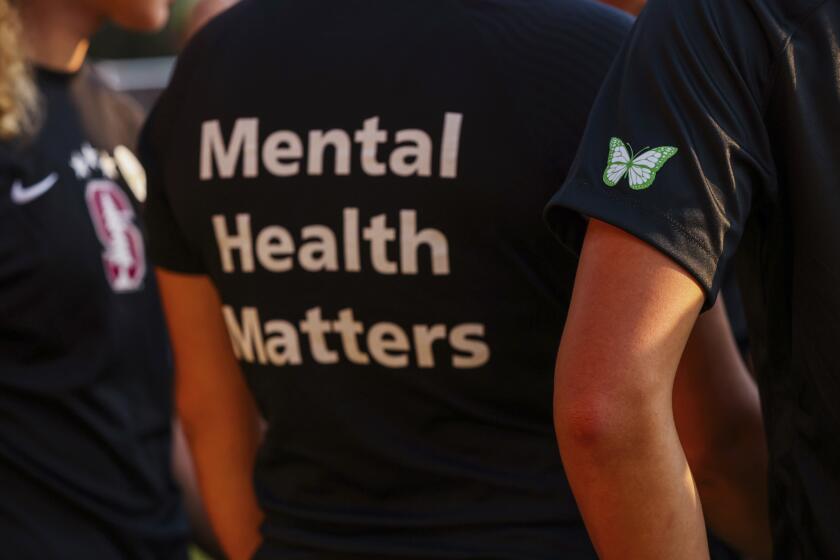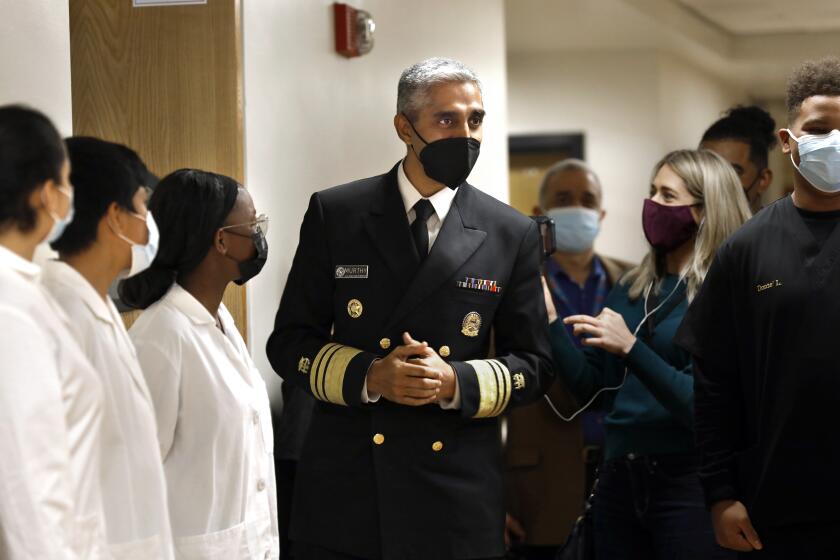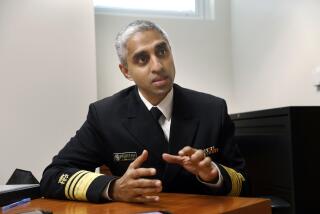Loneliness is an epidemic, and the health risks are ‘profound,’ U.S. surgeon general warns

Isolation and loneliness are an epidemic as damaging to Americans’ individual and public health as smoking and obesity, the surgeon general of the United States said in a stark advisory issued Tuesday.
Nearly half of U.S. adults reported experiencing loneliness in recent years, according to research cited in the advisory. A 2021 study commissioned by the Cigna healthcare company showed 79% of people ages 18 to 24 reported feeling lonely — a rate nearly twice as high as that of seniors ages 66 and older.
Though the issue was exacerbated by the COVID-19 pandemic, it has long been mounting — the rate of loneliness among young adults increased every year from 1976 to 2019, Surgeon General Vivek H. Murthy pointed out.
Being socially disconnected can have both mental and physical consequences. It puts people at greater risk for anxiety and depression, and also increases the possibility of dementia by 50%, stroke by 32% and heart disease by 29%. The risk of premature death from heightened isolation is comparable to smoking 15 cigarettes a day and may be even greater than that associated with obesity and physical inactivity, according to the report.
Still, studies show that 20% of people who feel lonely or isolated do not recognize it as a major problem, according to the advisory. Murthy laid out a national strategy to combat what he called “profound threats to our health and well-being,” saying the U.S. needs to address the epidemic with the same energy and intention it does the opioid addiction crisis or tobacco use.
“If we fail to do so, we will pay an ever-increasing price in the form of our individual and collective health and well-being,” Murthy said. “And we will continue to splinter and divide until we can no longer stand as a community or a country.”
The pandemic took a harsh toll on U.S. teen girls’ mental health, with almost 60% reporting feelings of persistent sadness or hopelessness
The report describes social isolation as objectively having few social connections or interactions, while loneliness is a subjective and internal feeling resulting from a gap between the actual connections people experience versus the desired connections they yearn for.
Research shows people are spending less time with friends and family or participating in clubs or organizations, driven in part by technology winding its way into our social interactions. Some people move away from their communities; many others focus on their careers at the expense of their personal relationships. Studies cited in the advisory showed that between 2003 and 2020, time spent with friends decreased by 20 hours per month while time spent alone increased by about 24 hours per month.
And that rise in isolation may be eroding our trust for one another: Polls conducted in 1972 showed 45% of Americans felt they could reliably trust other Americans; that number shrank to roughly 30% in 2016, the advisory notes.
It’s a trend that goes against human nature and is producing adverse effects on individual and societal health, said Julianne Holt-Lunstad, a professor of psychology and neuroscience at Brigham Young University and the advisory’s lead science editor.
“Humans are a social species,” Holt-Lunstad said. “Throughout human history, we’ve needed to rely on others for survival, so it makes sense that our bodies are adapted to promote survival.”
Because of the way humans evolved and adapted, feeling disconnected, particularly from those we trust, becomes “a very threatening state,” Holt-Lunstad said. “It takes more energy, and our bodies respond accordingly.”
Our hope is that we can help make the cascade of threats to your mental health a little easier to manage.
Isolation causes our brains to become more active and signal various physiological responses that essentially throw our bodies out of rhythm, she said. One example is inflammation: Evidence shows that being isolated and lonely is associated with chronic inflammation, which increases risk of cardiovascular disease, cancer, diabetes, depression and Alzheimer’s disease.
“There are many cascading biological responses that are occurring that when these physiological changes are dysregulated on a chronic basis; this can increase risk for developing a variety of chronic illnesses,” Holt-Lunstad said.
It can also affect community outcomes, ranging from population health to community safety, civic engagement and prosperity. “This is both an individual as well as a societal-level health concern,” she said.
The pandemic compounded the decline of social connections, as well as isolation and loneliness, by cutting people off from their support networks. But it also gave people a sense of how essential connection is, Holt-Lunstad said, as they saw how less time with friends or family harmed their well-being and that of those around them.
The advisory is to call attention to a “youth mental health crisis” and recommend resources to call on and actions to take.
The surgeon general’s advisory, 82 pages long, issues a public call to action to foster greater social connection and provides a national plan to achieve it.
Its six pillars include strengthening social infrastructure in local communities and mobilizing the health sector, offering recommendations that government agencies, workplaces and others can take to bring people together in meaningful ways.
In an essay published in the New York Times days before Tuesday’s report, Murthy described his own struggles with loneliness and underscored the risks facing America.
“Addressing the crisis of loneliness and isolation is one of our generation’s greatest challenges,” Murthy wrote. “By building more connected lives and more connected communities, we can strengthen the foundation of our individual and collective well-being and we can be better poised to respond to the threats we are facing as a nation.”
More to Read
Sign up for Essential California
The most important California stories and recommendations in your inbox every morning.
You may occasionally receive promotional content from the Los Angeles Times.














